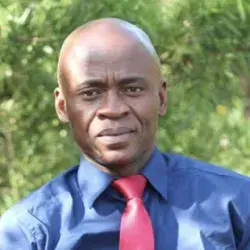Advancing community conservation in rural DRC
[[{"fid":"61711","view_mode":"full","fields":{"format":"full","alignment":"","field_file_image_alt_text[und][0][value]":"Photo of small-scale forest community farmers on farm in DRC","field_file_image_title_text[und][0][value]":"Sustainable agriculture practices are generating more income for small-scale farmers in DRC","field_caption[und][0][value]":"","field_caption[und][0][format]":"full_html"},"type":"media","field_deltas":{"1":{"format":"full","alignment":"","field_file_image_alt_text[und][0][value]":"Photo of small-scale forest community farmers on farm in DRC","field_file_image_title_text[und][0][value]":"Sustainable agriculture practices are generating more income for small-scale farmers in DRC","field_caption[und][0][value]":"","field_caption[und][0][format]":"full_html"}},"link_text":null,"attributes":{"alt":"Photo of small-scale forest community farmers on farm in DRC","title":"Sustainable agriculture practices are generating more income for small-scale farmers in DRC","class":"media-element file-full","data-delta":"1"}}]]
Extremely remote, Maringa-Lopori-Wamba is one of the least-developed regions in the Democratic Republic of Congo. It is a vast landscape measuring 74,000 sq. km—covered in rainforest, swamps, and rivers—with no roads and where the population faces extreme poverty. Spreading the message of conservation is not easy.
African Wildlife Foundation (AWF) started its programs in this landscape in the aftermath of a troubled period, which had made life hard for the people in the area. The local economy—which had been based on cash crops, such as coffee, oil palms, and rubber trees—was brutally disrupted, leaving forest resource exploitation as the only way to survive.
We are developing community conservation programs to protect the area’s biodiversity while taking concrete actions to benefit the communities. In addition to strengthening ecological monitoring efforts, we collaborate with locals on sustainable income-generating opportunities so they avoid hunting bonobo and bongo for bush meat, or poaching forest elephant and pangolin.
[[{"fid":"61713","view_mode":"full","fields":{"format":"full","alignment":"","field_file_image_alt_text[und][0][value]":"Full portrait of adult bonobo in DRC","field_file_image_title_text[und][0][value]":"Bonobo population numbers are rising in MLW as more habitat is protected","field_caption[und][0][value]":"","field_caption[und][0][format]":"full_html"},"type":"media","field_deltas":{"3":{"format":"full","alignment":"","field_file_image_alt_text[und][0][value]":"Full portrait of adult bonobo in DRC","field_file_image_title_text[und][0][value]":"Bonobo population numbers are rising in MLW as more habitat is protected","field_caption[und][0][value]":"","field_caption[und][0][format]":"full_html"}},"link_text":null,"attributes":{"alt":"Full portrait of adult bonobo in DRC","title":"Bonobo population numbers are rising in MLW as more habitat is protected","class":"media-element file-full","data-delta":"3"}}]]
Organizing communities
Practically speaking, community conservation begins by getting local people invested in the work. In partnership with local organizations, we established development and conservation committees within the communities. We then trained the committees in collective decision making.
These committees serve as liaisons between AWF and their villages. They advocate for their villages’ interests, help communicate AWF’s conservation goals to their villages and, most importantly, solicit community members’ points of view. Through the development and conservation committees, AWF has worked with communities to designate land for different purposes, with zones for livelihood activities, such as agriculture, and for conservation. We also identified corridors to connect forest blocks—essential for maintaining the ecological integrity of the landscape.
One success story is the conservation efforts of the Ilima community. Ilima chose to engage with AWF even when neighboring villages refused. Ilima requested AWF’s assistance with improving its primary school in return for their conservation efforts. We reconstructed the formerly run-down primary school and, through our Classroom Africa program, continue to support the school with teacher training and conservation education.
[[{"fid":"61712","view_mode":"full","fields":{"format":"full","alignment":"","field_file_image_alt_text[und][0][value]":"Photo of AWF Senior Field Officer in Maringa-Lopori-Wamba speaking to primary school student","field_file_image_title_text[und][0][value]":"AWF's conservation eduation initiatives in Ilima change mindsets from an early age","field_caption[und][0][value]":"","field_caption[und][0][format]":"full_html"},"type":"media","field_deltas":{"2":{"format":"full","alignment":"","field_file_image_alt_text[und][0][value]":"Photo of AWF Senior Field Officer in Maringa-Lopori-Wamba speaking to primary school student","field_file_image_title_text[und][0][value]":"AWF's conservation eduation initiatives in Ilima change mindsets from an early age","field_caption[und][0][value]":"","field_caption[und][0][format]":"full_html"}},"link_text":null,"attributes":{"alt":"Photo of AWF Senior Field Officer in Maringa-Lopori-Wamba speaking to primary school student","title":"AWF's conservation eduation initiatives in Ilima change mindsets from an early age","class":"media-element file-full","data-delta":"2"}}]]
Forest concessions devoted to conservation
More recently, AWF helped Ilima and six other communities secure legal rights to the land they inhabit. In DRC, the forests are under the legal ownership of the government. However, the national government passed a law in 2014 that makes it possible for communities living in forests to apply for concessions. These concessions grant communities formal ownership and rights to decide how to use forest land where they have traditionally lived.
AWF alerted the communities to this new law and helped them complete the application process. Earlier this year, they became the first communities in the entire country to be granted forest concessions under the new law. The seven concessions cover approximately 1,000 sq. km.
Under the law, the communities must choose a use for their concessions that both generates income for them and adheres to sustainable management practices. Communities can pursue artisanal logging, collecting non-timber forest products or sustainable agro-forestry, among other options. But the Ilima community had already seen the benefits that conservation can bring. They have chosen to devote their entire forestry concession to conservation—about 400 sq. km of forest.
Working in the Maringa-Lopori-Wamba landscape has its challenges. I spend long periods away from my family in Kinshasa. I also have to traverse the vast, humid landscape by motorcycle and on foot (remember, there are no roads). But I love my job. When I go to the villages and hear people say that they now understand what AWF is doing, I know my 12 years with AWF have not been in vain. Every smile shared, every life impacted, is worth it.
> Learn more about how AWF has helped farmers through the Congo Shipping Project
